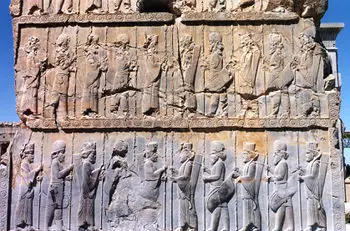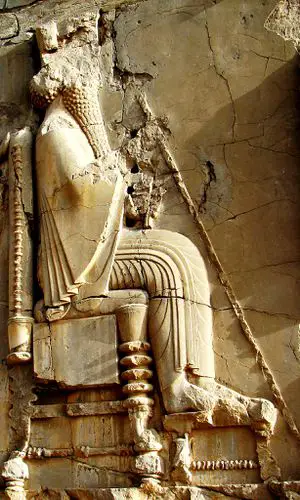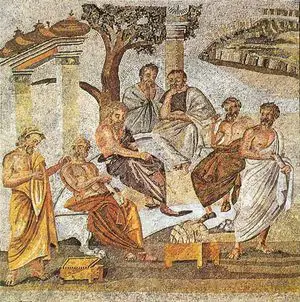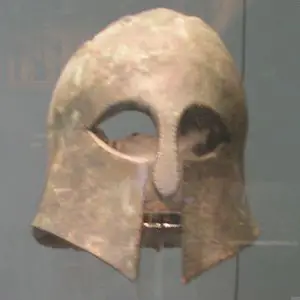What was the impact of the First Persian Invasion of Greece on Athens
The First Persian Invasion of Greece was an attempt by the Persian Empire to punish Athens and Eretria for their involvement in its internal affairs. It was also an effort to spread the influence of Persia throughout the Aegean Sea and into Greece. The first Persian Invasion of Greece was almost a complete success apart from the defeat at Marathon. The impact of the invasion on Athens was profound and it energized the city-state. The Persian invasion and its subsequent defeat meant that Athenian democracy was strengthened, it led to a cultural flourishing, changes in the military and the development of a large Athenian navy.
Background
The first Persian invasion of Greece began in 492 BC. The cause of the invasion was that the Athenians and their allies the Eretrians had supported the Greek city-states in Ionia (west-coast of Turkey). The Ionian Greeks had revolted against their Persian overlords and they had received the active support of the Athenians. They had sent a fleet of ships to the aid of the Ionians.[1] The Persians after a difficult fight regained control of Ionia and punished the rebels. The Persian invasion consisted of two distinct phases. The first campaign was conducted by land and it involved a Persian army advancing from modern Turkey into the Balkans. This invasion army was able to subjugate the Kingdom of Macedonia, which had strong links to the Greek City-States. The Persian, under Mardonius, also conquered Thrace. They intended to use Macedonia as a base for an attack on Greece.
The Persian monarch Darius I, was eager not only to punish the Athenians and the Eretrians but also to bring the entire Greek world under his sway.[2] Darius already controlled many Greek City-States in his empire. Darius sent ambassadors to all of the Greek City-States demanding that they do homage to Persia and become tributaries. The vast majority of the Greek ‘Polis’ or city-states agreed to accept Darius as their overlord in order to avoid a full-scale Persian invasion. However, Athens and Sparta refused to become tributaries and they killed the Persian emissaries. This was a grave offense in the eyes of the Persians.[3] Mardonius dispatched a huge armada to invade Greece, but his ships were scattered or destroyed in a storm, off the coast of Mount Athos. [4] This ended the first phase of the invasion.
The second phase of the Persian campaign began in 490 BC. The Persians sent a naval expedition to Greece and the Greek islands. The expedition carried a large army, many of them were ‘Immortals’ the elite troops of the Persian army. The Persian armada first reached the island of Naxos and it devastated this island[5]. It later seized several more islands in the Cyclades. The Persians added all of these to their Empire. Then they headed to Eretria and they laid siege to the main city on the island. The Persians sought to make an example of the island because of its support of the Ionian Greeks in their rebellion. After a short siege, the Persians burned the main city on the island and enslaved all the inhabitants and transported them to the Persian Empire.[6]
Next the Persian armada headed for the Greek mainland. They landed near Athens and they intended to destroy Athens. They were accompanied by the former tyrants of the city whom they intended to install in Athens as Persian puppets. The Athenians sent to Sparta for help but as it was a religious festival and the Spartans could not leave their city for a week.[7] Only the small state of Palatea helped the Athenians. The Athenians hoplites rushed out of their city in order to meet the Persian invaders. They were outnumbered by as much as three to one. After a stalemate of five days they attacked the Persians and it was a stunning victory. The Persians lost many men and the Greeks sustained less than 200 casualties. The Persians retreated to their ships and then attempted to reach Athens while the Athenians hoplites were still on the battlefield[8]. The Athenians raced to their city and thwarted the Persians from landing and the forces of Darius retreated to Asia Minor. The Athenian victory amazed Greece and even the Spartans praised them for their victory at Marathon.
Impact on Athenian Democracy
Athens had for many years being governed by tyrants. They had seized control after the failure of the Athenians first effort at democracy. The tyrants, known as the Peisistratids had been in power for almost fifty years and had brought stability and a measure of prosperity to Athens. The tyrants they had only been expelled some two decades previously. The young Athenian democracy was still trying to establish itself, but It was dogged by internal divisions. The Athenian system was different from the indirect or representative form of democracy that is prevalent in the modern world.
Athenian democracy was a direct democracy, in which all citizens voted directly on legislation and policies. They even voted on issues such as peace and war. Only male citizens could participate in the democratic process. Slaves, women, and foreigners were not entitled to take part. The citizens voted directly in an assembly. This system was inherently unstable and especially in the years prior to the Persian invasion, it seemed likely to fail, as had the other experiments in democracy. Not all Athenians supported the democracy and the city’s traditional elite the aristocracy would often openly hinder and obstruct the workings of the assembly. The democracy was only able to maintain itself in power by regularly voting to expel those it regarded as trying to subvert it.[9]
However, the victory of Marathon convinced the Athenians that their system was the best. They saw the great victory over the Persians as a vindication not only of their arms but also their political system. Those who had fought at Marathon and defeated the Persians were ordinary citizens. They credited their democracy for their victory. They compared their victory with the willingness of the other Greek city-states to submit to the forces to Darius I.[10] To many in Athens, the democracy that they had established was the best political system. The many detractors of democracy were silenced and it was overwhelmingly accepted by the majority of the population. The Athenians had come very close to losing their freedom and they began to associate democracy with the preservation of their freedom. The victory at Marathon and the defeat of the Persian invasion strengthened democracy and it was not challenged again until the dark days in the aftermath of the Sicilian Expedition during the Peloponnesian War.

Effect on Athenian Culture
The defeat of the First Persian invasion of Greece was seen as the start of the Golden Age of Athens. This was the period of remarkable cultural achievements by the Athenians and those who came to live in the city. In this period, Athens produced some of the greatest figures in Classical Civilisation. In the next century, the Athenians produced philosophers such as Plato, Socrates, and Aristotle. The Philosophical School, the Sophists also flourished in the city[11]. The city also developed drama and produced the great tragedians Euripides, Sophocles, and Aeschylus. The first great comic dramatist in western literature Aristophanes also wrote in Athens. The two founding fathers of western historical writing, Herodotus, and Thucydides all worked in the city.
Art and architecture also flourished in the aftermath of the Battle of Marathon. It is no coincidence that the Athenian produced these cultural figures and works of art in the aftermath of the defeat of the Persians. The victory gave the Athenians great belief and they were also convinced that freedom was essential for the good life or ‘eudemonia.’[12] In the aftermath of Marathon, the Athenians were very conscious of how precarious was their freedom and they cherished it. This led them to encourage all forms of self-expression and freedom of thought and speech.[13] This energized the Athenians and the city soon became a center for creativity. This made Athens attractive for intellectuals from all over the Greek world and the city benefitted from Ionian Greek intellectuals fleeing the Persians. Many of the Sophists, for example, came to the city to benefit from the liberal atmosphere in the city. Then the great victory over the Persians filled the populace of Athens with great self-belief and they came to believe that they could do anything [14]. The Athenians, unlike other people, believed that reason and willpower could achieve anything. This was partly inspired by the self-confidence instilled by the defeat of the mighty Persians. This belief in reason and human potential led to an early form of humanism in Athens. This, in turn, encouraged the development of great works and ideas in the city.
The Athenian leadership drew many lessons from their victory over the Persians. This was typical of the rational approach taken by the Athenians to any problems they faced. The first lesson that they learned was that the hoplites were particularly effective against the Persians. The invaders had been only lightly armed and had had little armor. By contrast, the hoplites were heavy infantry and they had body armor, including greaves and breastplates[15]. The Athenians also learned that the phalanx, a formation that involved hoplites fighting in ranks, shoulder to shoulder, could overcome even numerically superior formations. The Athenians went on to develop the hoplite and to perfect the phalanx. Then the other great lesson learned by the city was the importance of the navy. They knew that if the first Persian fleet had not been shipwrecked off the coast of Mount Athos the Athenians could have been defeated. Then the mere fact that the Persians had been able to land so close to their city showed how vulnerable they were to an attack from the sea.[16]
In the years following Marathon, the Athenians were very much concerned with the construction of a fleet. Many Athenians knew that the Persians would one day return and seek revenge. Figures such as Themistocles called for the building of a large navy. A major silver mine was discovered in Attica and he persuaded the Athenians to build ships out of the proceeds.[17] Themistocles a very shrewd man, appears to have bribed the Oracle at Delphi to urge the Athenians to follow his policy. After this the Athenians developed a strong navy, the largest in Greece. This was to have a dramatic impact not only on the city but on all of Greece[18]. Without the Athenian navy, the Second Persian Invasion of Greece would have probably succeeded. Furthermore, the Athenian navy also allowed the city to become a great power and the establishment of the Athenian Empire.[19]
Conclusion
The First Persian Invasion could have resulted in the obliteration of Athens. That city could have shared the same fate as Eretria and Naxos. However, it not only managed to survive the onslaught of the Persians but also flourished. The city was energized by its ability to defeat the Persian Empire, the regional superpower. This transformed the city and made it into one of the greatest powers in Greece and indeed in the Mediterranean. The Athenian victory over the Persians helped to strengthen democracy and unleashed forces that lead to one of the greatest periods of cultural achievement in human history. Then the Athenians learned much from their defeat of Darius I army and navy. They encouraged more citizens to become hoplites and they further refined the phalanx and this made the Athenian army very formidable. They also realized that they need to expand their navy. These policies allowed the city-state not only to defeat another Persian invasion but also allowed them to establish an empire in the later half of the fifth century BCE.
References
- Jump up ↑ Herodotus. 5. 7
- Jump up ↑ Herodotus. 5. 6
- Jump up ↑ Herodotus. 7. 6
- Jump up ↑ Holland, Tom. Persian Fire: The First World Empire and the Battle for the West (London, Abacus, 2006), p. 124
- Jump up ↑ Holland, p. 156
- Jump up ↑ Green, Peter. The Greco-Persian Wars. (Berkeley, University of California Press, 1996), p. 156
- Jump up ↑ Holland, p. 167
- Jump up ↑ Green, p. 167
- Jump up ↑ Fine, JVA. The Ancient Greeks: A Critical History. (Harvard, Harvard University Press, 1983), p. 178
- Jump up ↑ Holland, p 178
- Jump up ↑ Fine, p. 116
- Jump up ↑ Aristotle. Ethics. 7 9.
- Jump up ↑ Russell, Bertrand, A History of Western Philosophy (London, Longman, 2010), p. 45
- Jump up ↑ Herodotus, 7. 9
- Jump up ↑ Fine, p. 167
- Jump up ↑ Holland, p. 189
- Jump up ↑ Thucydides, 1, 7.
- Jump up ↑ Thucydides 1, 23.
- Jump up ↑ Thucydides, 1, 33
Admin, Ewhelan and EricLambrecht



